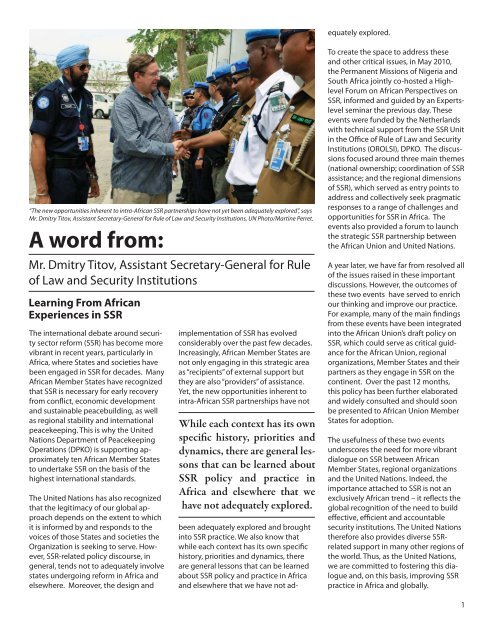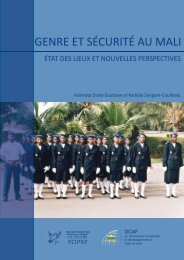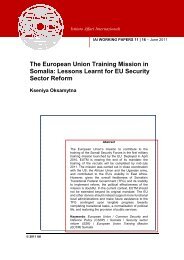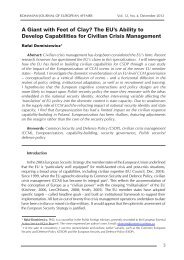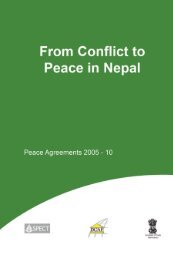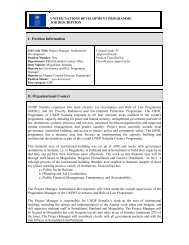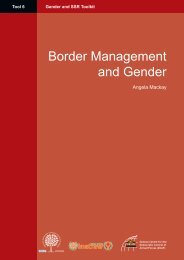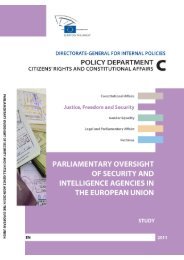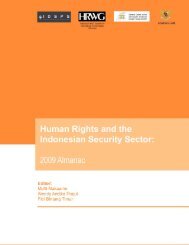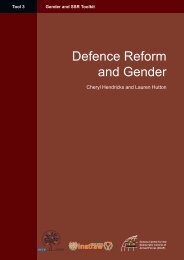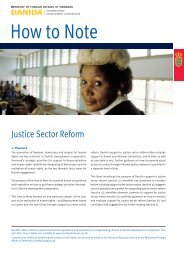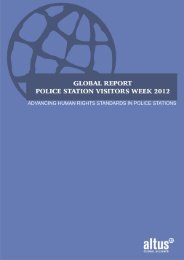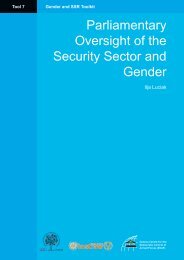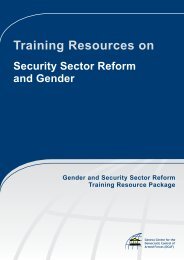African Perspectives on SSR.pdf - UN Peacemaker
African Perspectives on SSR.pdf - UN Peacemaker
African Perspectives on SSR.pdf - UN Peacemaker
Create successful ePaper yourself
Turn your PDF publications into a flip-book with our unique Google optimized e-Paper software.
een adequately explored and brought<br />
into <strong>SSR</strong> practice. We also know that<br />
while each c<strong>on</strong>text has its own specific<br />
history, priorities and dynamics, there<br />
are general less<strong>on</strong>s that can be learned<br />
about <strong>SSR</strong> policy and practice in Africa<br />
and elsewhere that we have not adequately<br />
explored.<br />
“The new opportunities inherent to intra-<str<strong>on</strong>g>African</str<strong>on</strong>g> <strong>SSR</strong> partnerships have not yet been adequately explored”, says<br />
Mr. Dmitry Titov, Assistant Secretary-General for Rule of Law and Security Instituti<strong>on</strong>s, <strong>UN</strong> Photo/Martine Perret.<br />
A word from:<br />
Mr. Dmitry Titov, Assistant Secretary-General for Rule<br />
of Law and Security Instituti<strong>on</strong>s<br />
Learning From <str<strong>on</strong>g>African</str<strong>on</strong>g><br />
Experiences in <strong>SSR</strong><br />
The internati<strong>on</strong>al debate around security<br />
sector reform (<strong>SSR</strong>) has become more<br />
vibrant in recent years, particularly in<br />
Africa, where States and societies have<br />
been engaged in <strong>SSR</strong> for decades. Many<br />
<str<strong>on</strong>g>African</str<strong>on</strong>g> Member States have recognized<br />
that <strong>SSR</strong> is necessary for early recovery<br />
from c<strong>on</strong>flict, ec<strong>on</strong>omic development<br />
and sustainable peacebuilding, as well<br />
as regi<strong>on</strong>al stability and internati<strong>on</strong>al<br />
peacekeeping. This is why the United<br />
Nati<strong>on</strong>s Department of Peacekeeping<br />
Operati<strong>on</strong>s (DPKO) is supporting approximately<br />
ten <str<strong>on</strong>g>African</str<strong>on</strong>g> Member States<br />
to undertake <strong>SSR</strong> <strong>on</strong> the basis of the<br />
highest internati<strong>on</strong>al standards.<br />
The United Nati<strong>on</strong>s has also recognized<br />
that the legitimacy of our global approach<br />
depends <strong>on</strong> the extent to which<br />
it is informed by and resp<strong>on</strong>ds to the<br />
voices of those States and societies the<br />
Organizati<strong>on</strong> is seeking to serve. However,<br />
<strong>SSR</strong>-related policy discourse, in<br />
general, tends not to adequately involve<br />
states undergoing reform in Africa and<br />
elsewhere. Moreover, the design and<br />
implementati<strong>on</strong> of <strong>SSR</strong> has evolved<br />
c<strong>on</strong>siderably over the past few decades.<br />
Increasingly, <str<strong>on</strong>g>African</str<strong>on</strong>g> Member States are<br />
not <strong>on</strong>ly engaging in this strategic area<br />
as “recipients” of external support but<br />
they are also “providers” of assistance.<br />
Yet, the new opportunities inherent to<br />
intra-<str<strong>on</strong>g>African</str<strong>on</strong>g> <strong>SSR</strong> partnerships have not<br />
While each c<strong>on</strong>text has its own<br />
specific history, priorities and<br />
dynamics, there are general less<strong>on</strong>s<br />
that can be learned about<br />
<strong>SSR</strong> policy and practice in<br />
Africa and elsewhere that we<br />
have not adequately explored.<br />
To create the space to address these<br />
and other critical issues, in May 2010,<br />
the Permanent Missi<strong>on</strong>s of Nigeria and<br />
South Africa jointly co-hosted a Highlevel<br />
Forum <strong>on</strong> <str<strong>on</strong>g>African</str<strong>on</strong>g> <str<strong>on</strong>g>Perspectives</str<strong>on</strong>g> <strong>on</strong><br />
<strong>SSR</strong>, informed and guided by an Expertslevel<br />
seminar the previous day. These<br />
events were funded by the Netherlands<br />
with technical support from the <strong>SSR</strong> Unit<br />
in the Office of Rule of Law and Security<br />
Instituti<strong>on</strong>s (OROLSI), DPKO. The discussi<strong>on</strong>s<br />
focused around three main themes<br />
(nati<strong>on</strong>al ownership; coordinati<strong>on</strong> of <strong>SSR</strong><br />
assistance; and the regi<strong>on</strong>al dimensi<strong>on</strong>s<br />
of <strong>SSR</strong>), which served as entry points to<br />
address and collectively seek pragmatic<br />
resp<strong>on</strong>ses to a range of challenges and<br />
opportunities for <strong>SSR</strong> in Africa. The<br />
events also provided a forum to launch<br />
the strategic <strong>SSR</strong> partnership between<br />
the <str<strong>on</strong>g>African</str<strong>on</strong>g> Uni<strong>on</strong> and United Nati<strong>on</strong>s.<br />
A year later, we have far from resolved all<br />
of the issues raised in these important<br />
discussi<strong>on</strong>s. However, the outcomes of<br />
these two events have served to enrich<br />
our thinking and improve our practice.<br />
For example, many of the main findings<br />
from these events have been integrated<br />
into the <str<strong>on</strong>g>African</str<strong>on</strong>g> Uni<strong>on</strong>’s draft policy <strong>on</strong><br />
<strong>SSR</strong>, which could serve as critical guidance<br />
for the <str<strong>on</strong>g>African</str<strong>on</strong>g> Uni<strong>on</strong>, regi<strong>on</strong>al<br />
organizati<strong>on</strong>s, Member States and their<br />
partners as they engage in <strong>SSR</strong> <strong>on</strong> the<br />
c<strong>on</strong>tinent. Over the past 12 m<strong>on</strong>ths,<br />
this policy has been further elaborated<br />
and widely c<strong>on</strong>sulted and should so<strong>on</strong><br />
be presented to <str<strong>on</strong>g>African</str<strong>on</strong>g> Uni<strong>on</strong> Member<br />
States for adopti<strong>on</strong>.<br />
The usefulness of these two events<br />
underscores the need for more vibrant<br />
dialogue <strong>on</strong> <strong>SSR</strong> between <str<strong>on</strong>g>African</str<strong>on</strong>g><br />
Member States, regi<strong>on</strong>al organizati<strong>on</strong>s<br />
and the United Nati<strong>on</strong>s. Indeed, the<br />
importance attached to <strong>SSR</strong> is not an<br />
exclusively <str<strong>on</strong>g>African</str<strong>on</strong>g> trend – it reflects the<br />
global recogniti<strong>on</strong> of the need to build<br />
effective, efficient and accountable<br />
security instituti<strong>on</strong>s. The United Nati<strong>on</strong>s<br />
therefore also provides diverse <strong>SSR</strong>related<br />
support in many other regi<strong>on</strong>s of<br />
the world. Thus, as the United Nati<strong>on</strong>s,<br />
we are committed to fostering this dialogue<br />
and, <strong>on</strong> this basis, improving <strong>SSR</strong><br />
practice in Africa and globally.<br />
1


